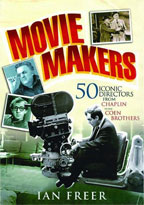 Book Reviews: Oct 2010

From D. W. Griffith to Tim Burton, from John Ford to Spike Lee, from Elia Kazan to Steven Spielberg, from Jean-Luc Godard to Quentin Tarantino, cinema scholar Ian Freer, assistant editor of the British film magazine Empire , provides opinionated, entertaining, and astute synopses of the great directors. Cinephiles will relish this engaging, briskly written volume. Consider Freer’s introduction to John Huston (The Maltese Falcon, The Treasure of the Sierra Madre, The Asphalt Jungle, The African Queen): “Huston—director, writer, actor, painter, boxer, gambler, hell-raiser—was both a rebel and a renaissance man. As a movie maker he traded in tough narratives that dramatized a contemporary male-dominated universe and was never afraid to tackle tough issues head on. As a man he was cinema’s Ernest Hemingway—the writer was a friend—the linchpin in a Hollywood dynasty, married five times, sentimental, sensitive, driven by an unbridled lust for life. Even compared with the larger-than-life characters he created, Huston was a titan.” Or take Freer’s assessment of Francis Ford Coppola (The Godfather, The Godfather Part II, The Conversation, Apocalypse Now), “cinema’s greatest gambler. He has enjoyed box-office and Oscar triumphs, faced critical brickbats and bankruptcy but always bounced back to defiantly pursue his own sense of cinematic adventure. His reputation would have been assured were it only for the back-to-back masterpieces he made during the 1970s…one of the greatest runs by any filmmaker in any period of film history. But equally important has been his desire to push boundaries, both in the advancement of technology and in fostering a more European, personal approach to filmmaking within the Hollywood mainstream.” Freer’s entries, well illustrated with photographs, offer both professional and personal information about the directors. He includes a “Must-See Movies” list for every film maker and peppers his text with memorable quotes. Mel Brooks on David Lynch (Eraserhead, The Elephant Man, Blue Velvet): “He’s Jimmy Stewart from Mars.” Sam Peckinpah (Ride the High Country, Major Dundee, The Wild Bunch, The Getaway): “I can’t direct when I’m sober.” Orson Welles (Citizen Kane, The Magnificent Ambersons, Touch of Evil): “I started at the top and worked down.” Woody Allen (Sleeper, Annie Hall, Manhattan, Hannah and Her Sisters, Crimes and Misdemeanors): “I don’t want to achieve immortality through my work…I want to achieve it through not dying.” Stanley Kubrick (Paths of Glory, Dr. Strangelove, 2001: A Space Odyssey, A Clockwork Orange, The Shining, Full Metal Jacket): “If it can be written or thought, it can be filmed.” Billy Wilder (Double Indemnity, Sunset Boulevard, Some Like It Hot, The Apartment): “A director must be a policeman, a midwife, a psychoanalyst, a sycophant, and a bastard.” Martin Scorsese (Mean Streets, Taxi Driver, Raging Bull, The Last Temptation of Christ, Goodfellas): “My whole life has been movies and religion. That’s it. Nothing else.” Readers may take umbrage with some of Freer’s choices. Missing, for example, are George Stevens (A Place in the Sun, Shane, Giant) and Fred Zinnemann (High Noon, From Here to Eternity, A Man for All Seasons). And how about John Sturges (Bad Day at Black Rock, Gunfight at the O. K. Corral, The Magnificent Seven, The Great Escape), Mike Nichols (Who’s Afraid of Virginia Woolf?, The Graduate, Silkwood, Angels in America), and Nicholas Ray (In a Lonely Place, Rebel Without a Cause, Bigger Than Life)? “It is with a heavy heart that some truly fine directors have been excluded,” he admits. Despite these omissions, Movie Makers is a sterling text. Two thumbs up for Ian Freer.
 |
 "Movie Makers: 50 Iconic Directors from Chaplin to the Coen Brothers"
"Movie Makers: 50 Iconic Directors from Chaplin to the Coen Brothers"